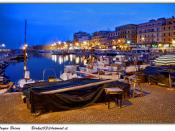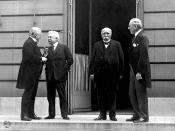Jonathan Then
History 1000C
Essay 3 (Midterm)
Italy After World War I show how each of the following led to the rise of a dictatorship:
a.Economic conditions
b.Weakness of parliamentary government
c.Lack of democratic foundation
d.Fear of communism
e.Strong leadership
Giolitti's resignation in March 1914 a new government was formed by the more conservative Antonio Salandra. In June came "Red Week," a period of widespread rioting throughout Romagna and the Marche, which was precipitated by the killing of three antimilitarist demonstrators at Ancona. When World War I broke out in August, the Salandra government stayed neutral and began to negotiate with both sides?a policy described by Foreign Minister Sidney Sonnino as "sacred egoism." The Austrians eventually agreed to grant Trentino to Italy, but the Entente (France, Britain, and Russia) made a more generous offer, promising Italy not only Trentino but also South Tyrol, Trieste, Gorizia, Istria, and northern Dalmatia.
The Italians accepted this offer at the secret Treaty of London (April 1915) and joined the war against Austria-Hungary a month later, hoping for major territorial gains.
The negotiations, conducted by the foreign and prime ministers and a handful of diplomats, had been kept secret. The majority of deputies, meanwhile, favored neutrality, as did former Prime Minister Giolitti, the major opposition groups (Catholics and Socialists), and most of the population. War, therefore, was supported only by the conservatives in government, by the Nationalist Association, a group formed in 1910 by Enrico Corradini and others to support Italian expansionism, by some Liberals who saw it as the culmination of the Risorgimento's fight for national unity, by Republicans and reformist Socialists who knew nothing of the Treaty of London and thought they were fighting for national liberation, and by some syndicalists and extremist Socialists?including Benito Mussolini, editor of...


